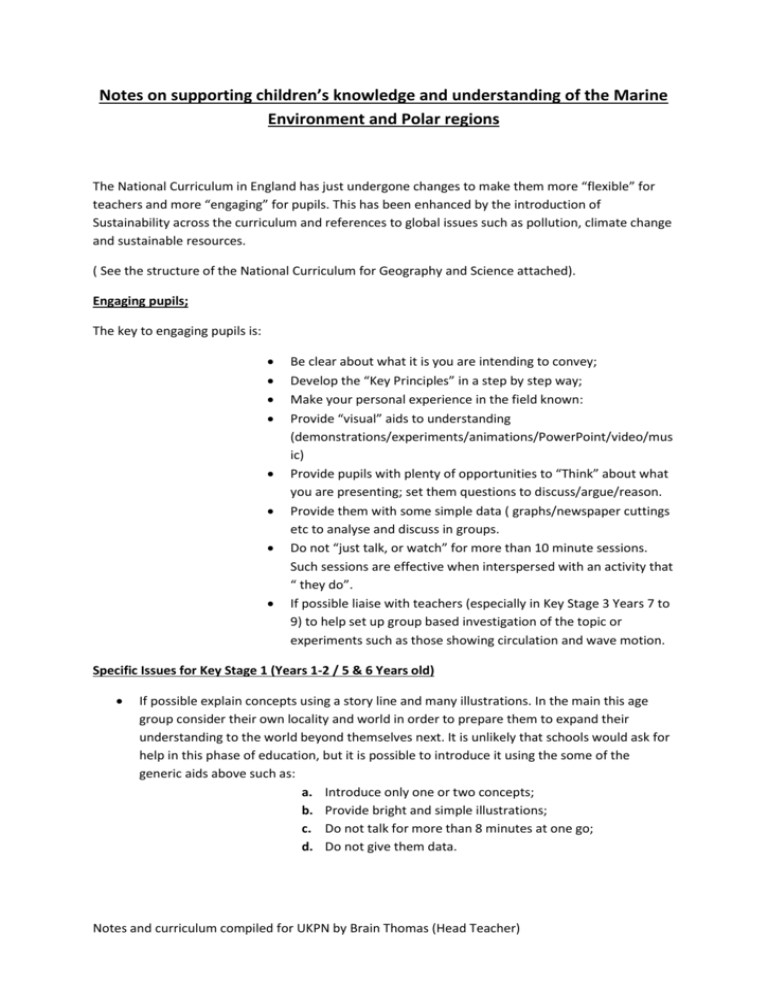Notes on supporting children's education
advertisement

Notes on supporting children’s knowledge and understanding of the Marine Environment and Polar regions The National Curriculum in England has just undergone changes to make them more “flexible” for teachers and more “engaging” for pupils. This has been enhanced by the introduction of Sustainability across the curriculum and references to global issues such as pollution, climate change and sustainable resources. ( See the structure of the National Curriculum for Geography and Science attached). Engaging pupils; The key to engaging pupils is: Be clear about what it is you are intending to convey; Develop the “Key Principles” in a step by step way; Make your personal experience in the field known: Provide “visual” aids to understanding (demonstrations/experiments/animations/PowerPoint/video/mus ic) Provide pupils with plenty of opportunities to “Think” about what you are presenting; set them questions to discuss/argue/reason. Provide them with some simple data ( graphs/newspaper cuttings etc to analyse and discuss in groups. Do not “just talk, or watch” for more than 10 minute sessions. Such sessions are effective when interspersed with an activity that “ they do”. If possible liaise with teachers (especially in Key Stage 3 Years 7 to 9) to help set up group based investigation of the topic or experiments such as those showing circulation and wave motion. Specific Issues for Key Stage 1 (Years 1-2 / 5 & 6 Years old) If possible explain concepts using a story line and many illustrations. In the main this age group consider their own locality and world in order to prepare them to expand their understanding to the world beyond themselves next. It is unlikely that schools would ask for help in this phase of education, but it is possible to introduce it using the some of the generic aids above such as: a. Introduce only one or two concepts; b. Provide bright and simple illustrations; c. Do not talk for more than 8 minutes at one go; d. Do not give them data. Notes and curriculum compiled for UKPN by Brain Thomas (Head Teacher) Topics that can be used with Key Stage 2 pupils ( Years 3-6) a. b. c. d. e. f. g. h. i. j. Current Circulation; Plate Tectonics; Water Columns; Rising Sea levels and climate change; Long shore drift; Life in the open oceans; Volcanic action; Earthquakes; Fossilization; Recent news from around the world. Examples of good demonstrations; a. b. c. d. e. f. Circulation in a tank using heat and food colouring; Floating polystyrene to illustration Oceanic Plates; Wave motion; Sedimentation and Fossilization; Floating Ice; Displacement; It is always vital to engage the pupils and that is best done by enthusiastic, sympathetic and patient teaching or sharing of experience and knowledge. With the right amount of the above children are capable of understanding and assimilating the more complex concepts. Notes and curriculum compiled for UKPN by Brain Thomas (Head Teacher)



![afl_mat[1]](http://s2.studylib.net/store/data/005387843_1-8371eaaba182de7da429cb4369cd28fc-300x300.png)




